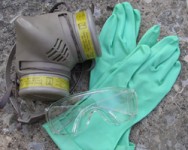Event Details
Date
April 8, 2015
Time
8:30 AM - 12:30 PM English Session / 1:00 PM - 4:30 PM Spanish Session
Location
CCE of Wayne County
1581 State Route 88
Newark, NY 14513
Cost
$20.00 per DEC Special Permit
Host
Cornell Vegetable ProgramKim Hazel
585-798-4265 x26
email Kim Hazel
DEC Special Permit Training (Wayne County)
April 8, 2015
DEC Special Permit allows non-certified workers to apply and handle federally restricted use pesticides: The Special Permit does not relieve the responsibility of the certified applicator that supervises these employees, but it does relieve the requirement of “on-site, within voice contact” supervision while federally restricted pesticides are being applied. Several of the pyrethroid, organophosphate, and carbamate insecticides such as Warrior, Capture, Diazinon, Lorsban and Lannate, and a few herbicides such as Gramoxone and Atrazine, are federally restricted-use materials.
At Special Permit trainings, non-certified applicators review Worker Protection Safety (WPS) handler training. They also learn about the potential hazards to non-target species and the environment, for each federally restricted-use pesticide. They also learn steps required on pesticide labels to prevent the risk of exposure to the applicators and non-target locations. Trainees receive a packet with summaries of this information.
A DEC Special Permit is valid for one year and needs to be renewed every year unless the pesticide applicator becomes certified.
Please pre-register your non-certified applicators for this training by April 3 using the registration form or contact Kim Hazel. Be prepared to provide your farm name and address, name of the applicators' supervisor and his/her pesticide license number, and names of applicators/handlers. Special permit forms will be prepared in advance to speed registration and dismissal from the training.
Note: Certified supervisors are required to attend the first 30 minutes of the training. Those supervisors that attend the first 30 minutes of the English training are not required to repeat the training in the Spanish session.
Additional Details (PDF; 461KB)
Registration Form (PDF; 259KB)



































